
generative-bi-using-rag
A solution guidance for Generative BI using Amazon Bedrock, Amazon OpenSearch with RAG
Stars: 99
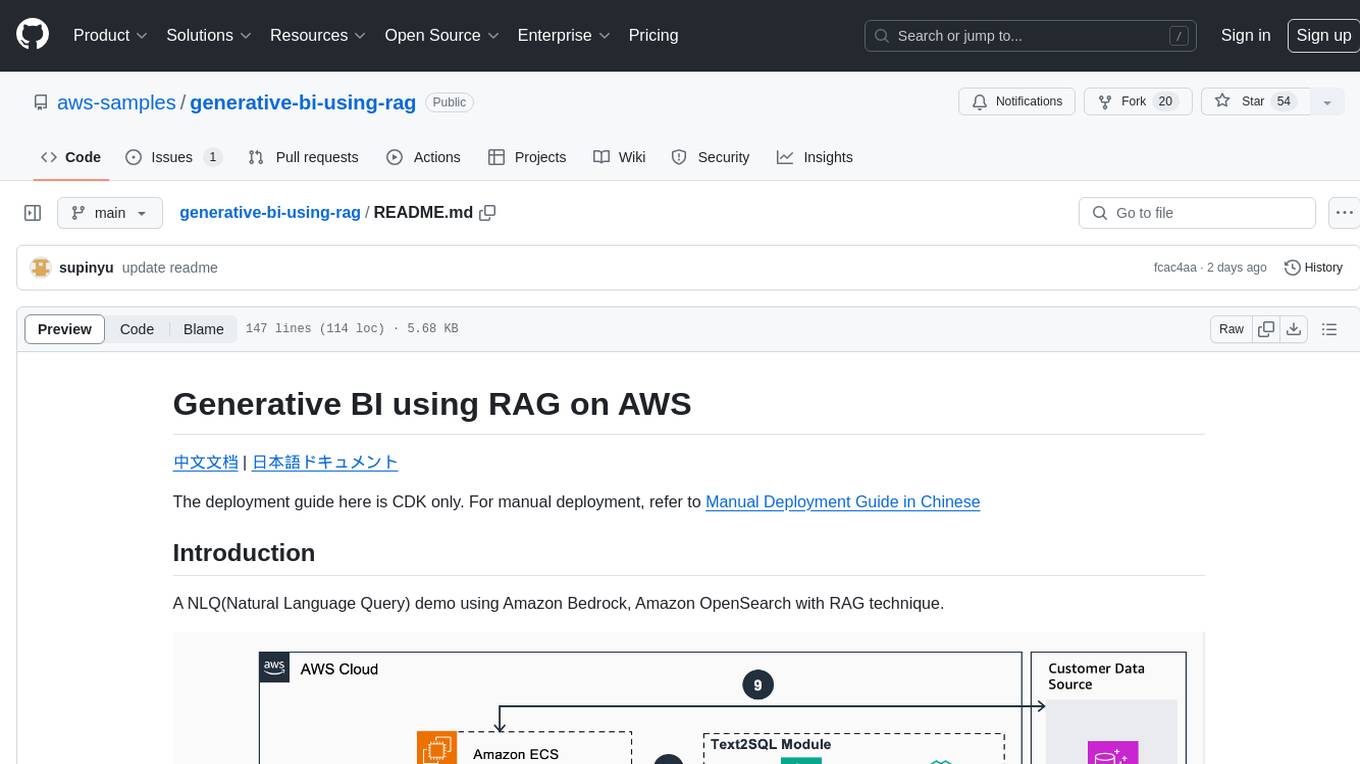
Generative BI using RAG on AWS is a comprehensive framework designed to enable Generative BI capabilities on customized data sources hosted on AWS. It offers features such as Text-to-SQL functionality for querying data sources using natural language, user-friendly interface for managing data sources, performance enhancement through historical question-answer ranking, and entity recognition. It also allows customization of business information, handling complex attribution analysis problems, and provides an intuitive question-answering UI with a conversational approach for complex queries.
README:
The deployment guide here is CDK only. For manual deployment or detailed guide, refer to Manual Deployment Guide in Chinese

A Generative BI demo using Amazon Bedrock, Amazon OpenSearch with RAG technique.
- Overview
- Prerequisites
- Deployment Steps
- Deployment Validation
- Running the Guidance
- Next Steps
- Cleanup
This is a comprehensive framework designed to enable Generative BI capabilities on customized data sources (RDS/Redshift) hosted on AWS. It offers the following key features:
- Text-to-SQL functionality for querying customized data sources using natural language.
- User-friendly interface for adding, editing, and managing data sources, tables, and column descriptions.
- Performance enhancement through the integration of historical question-answer ranking and entity recognition.
- Customize business information, including entity information, formulas, SQL samples, and analysis ideas for complex business problems.
- Add agent task splitting function to handle complex attribution analysis problems.
- Intuitive question-answering UI that provides insights into the underlying Text-to-SQL mechanism.
- Simple agent design interface for handling complex queries through a conversational approach.
This section presents an estimation of the AWS infrastructure costs to run this prototype on AWS. lt's important to note that the we've only used standard publit AWS pricing for the cost estimation. AWS offers enterprise discounts its large-spend clients via a Private Pricing. Your AWS Account team can support you throught this exercise. Hence the absolute cost numbers provided in this simulation are less relevant, the main purpose of this cost simulation exercise is to highlight the main cost drivers of the solution and how you can optimize the cost by tuning various cost elements.
As of May, 2024, the cost for running this Guidance with the default settings in the us-west-2 is approximately $219.21 per month for processing 2000 requests.
The following table provides a sample cost breakdown for deploying this Guidance with the default parameters in the US East (N. Virginia) Region for one month.
| AWS service | Dimensions | Cost [USD] per Month |
|---|---|---|
| Amazon ECS | v0.75 CPU 5GB | $11.51 |
| Amazon DynamoDB | 25 provisioned write & read capacity units per month | $ 14.04 |
| Amazon Bedrock | 2000 requests per month, with each request consuming 10000 input tokens and 1000 output tokens | $ 90.00 |
| Amazon OpenSearch Service | 1 domain with m5.large.search | $ 103.66 |
“CDK are optimized to best work to be initiated on <Amazon Linux 2023 AMI>. Deployment in another OS may require additional steps.”
- VPC
- IAM role with specific permissions
- Amazon Bedrock
- Amazon ECS
- Amazon DynamoDB
- Amazon Cognito
- Amazon OpenSearch Service
- Amazon Elastic Load Balancing
- Amazon SageMaker (Optional, if you need customized models to be deployed)
- Amazon Secrets Manager
us-west-2, us-east-2, us-east-1, ap-south-1, ap-southeast-1, ap-southeast-2, ap-northeast-1, eu-central-1, eu-west-1, eu-west-3, or any other region that supports the services (bedrock) used in the Guidance.
Please follow the instructions in the CDK Workshop to install the CDK toolkit. Make sure your environment have the authorization to create the resources.
The default password is [Empty] for GenBI Admin Web UI. If you need to set a password for the GenBI Admin Web UI, you can update the password in the
application/config_files/stauth_config.yaml
for example
credentials:
usernames:
jsmith:
email: [email protected]
name: John Smith
password: XXXXXX # To be replaced with hashed password
rbriggs:
email: [email protected]
name: Rebecca Briggs
password: XXXXXX # To be replaced with hashed password
cookie:
expiry_days: 30
key: random_signature_key # Must be string
name: random_cookie_name
preauthorized:
emails:
- [email protected]change the password 'XXXXXX' to hashed password
Use the python code below to generate XXXXXX. We need python 3.8 and up to run the code below:
from streamlit_authenticator.utilities.hasher import Hasher
hashed_passwords = Hasher(['password123']).generate()For global regions, execute the following commands:
Navigate to the CDK project directory:
cd generative-bi-using-rag/source/resources
Deploy the CDK stack, change the region to your own region if needed, for example, us-west-2, us-east-1, etc.:
export AWS_DEFAULT_REGION=us-west-1
cdk bootstrap
cdk deploy GenBiMainStack --require-approval never
You will see the following when deployed succeeded
GenBiMainStack.AOSDomainEndpoint = XXXXX.us-west-2.es.amazonaws.com
GenBiMainStack.APIEndpoint = XXXXX.us-west-2.elb.amazonaws.com
GenBiMainStack.FrontendEndpoint = XXXXX.us-west-2.elb.amazonaws.com
GenBiMainStack.StreamlitEndpoint = XXXXX.us-west-2.elb.amazonaws.com
After the CDK stack is deployed, wait around 40 minutes for the initialization to complete. Then, open the Web UI in your browser: https://your-public-dns
- Delete the CDK stack:
cdk destroy GenBiMainStack
For Tasks:
Click tags to check more tools for each tasksFor Jobs:
Alternative AI tools for generative-bi-using-rag
Similar Open Source Tools

generative-bi-using-rag
Generative BI using RAG on AWS is a comprehensive framework designed to enable Generative BI capabilities on customized data sources hosted on AWS. It offers features such as Text-to-SQL functionality for querying data sources using natural language, user-friendly interface for managing data sources, performance enhancement through historical question-answer ranking, and entity recognition. It also allows customization of business information, handling complex attribution analysis problems, and provides an intuitive question-answering UI with a conversational approach for complex queries.
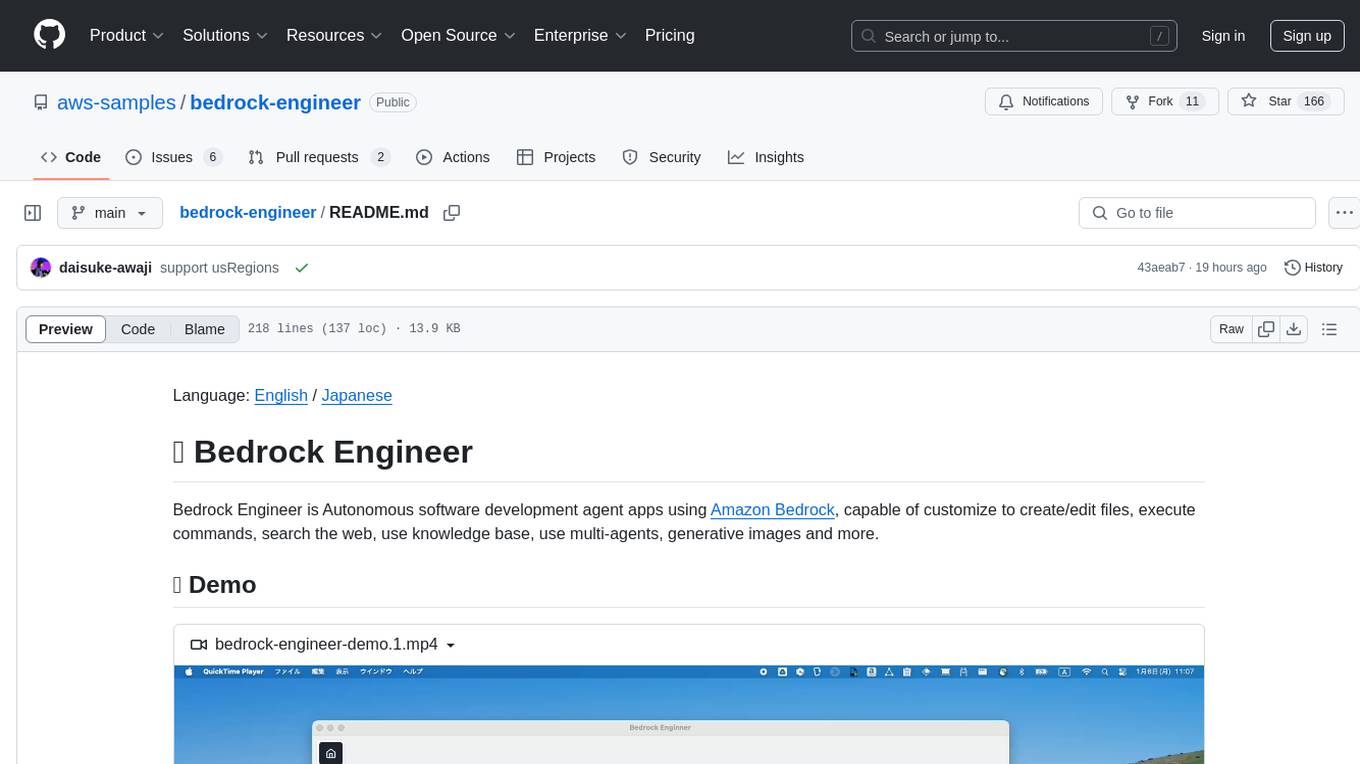
bedrock-engineer
Bedrock Engineer is an autonomous software development agent application that utilizes Amazon Bedrock. It allows users to customize, create/edit files, execute commands, search the web, use a knowledge base, utilize multi-agents, generate images, and more. The tool provides an interactive chat interface with AI agents, file system operations, web search capabilities, project structure management, code analysis, code generation, data analysis, agent and tool customization, chat history management, and multi-language support. Users can select and customize agents, choose from various tools like file system operations, web search, Amazon Bedrock integration, and system command execution. Additionally, the tool offers features for website generation, connecting to design system data sources, AWS Step Functions ASL definition generation, diagram creation using natural language descriptions, and multi-language support.
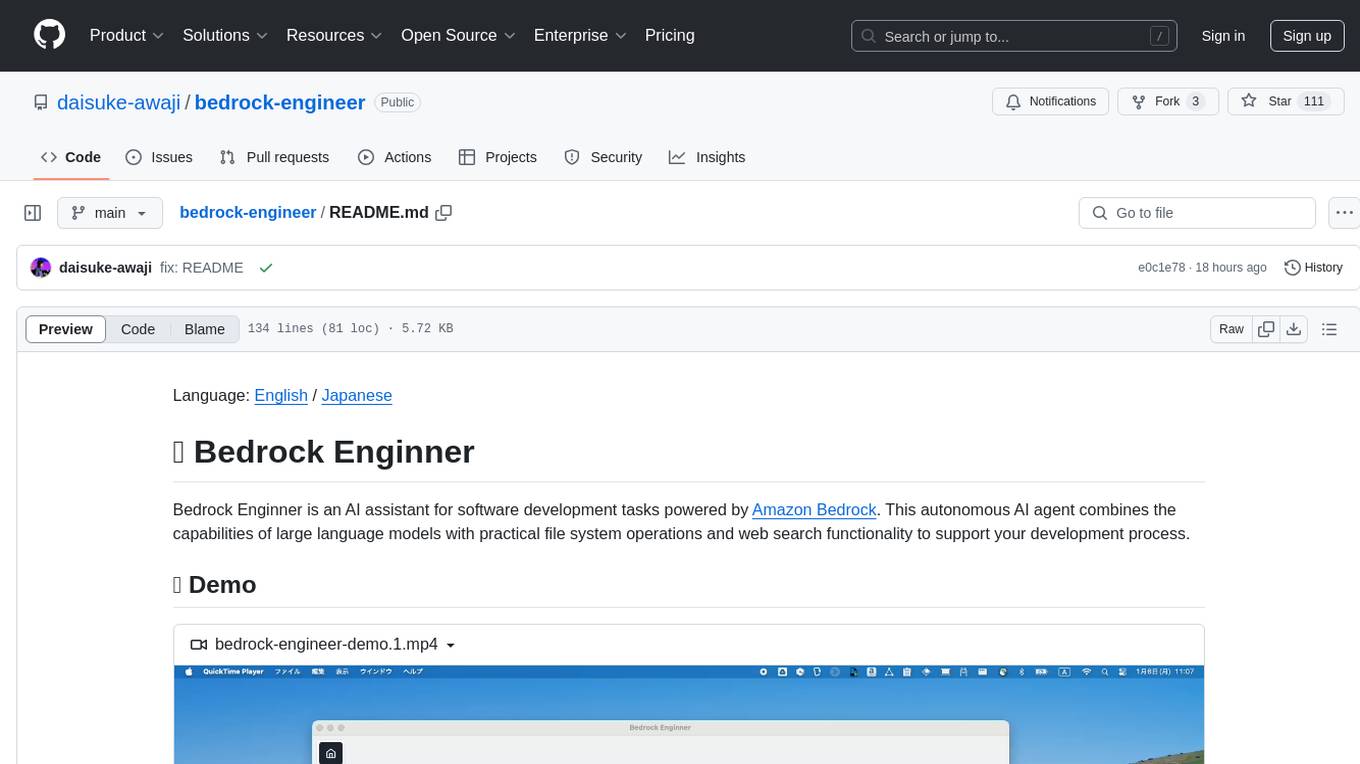
bedrock-engineer
Bedrock Engineer is an AI assistant for software development tasks powered by Amazon Bedrock. It combines large language models with file system operations and web search functionality to support development processes. The autonomous AI agent provides interactive chat, file system operations, web search, project structure management, code analysis, code generation, data analysis, agent and tool customization, chat history management, and multi-language support. Users can select agents, customize them, select tools, and customize tools. The tool also includes a website generator for React.js, Vue.js, Svelte.js, and Vanilla.js, with support for inline styling, Tailwind.css, and Material UI. Users can connect to design system data sources and generate AWS Step Functions ASL definitions.
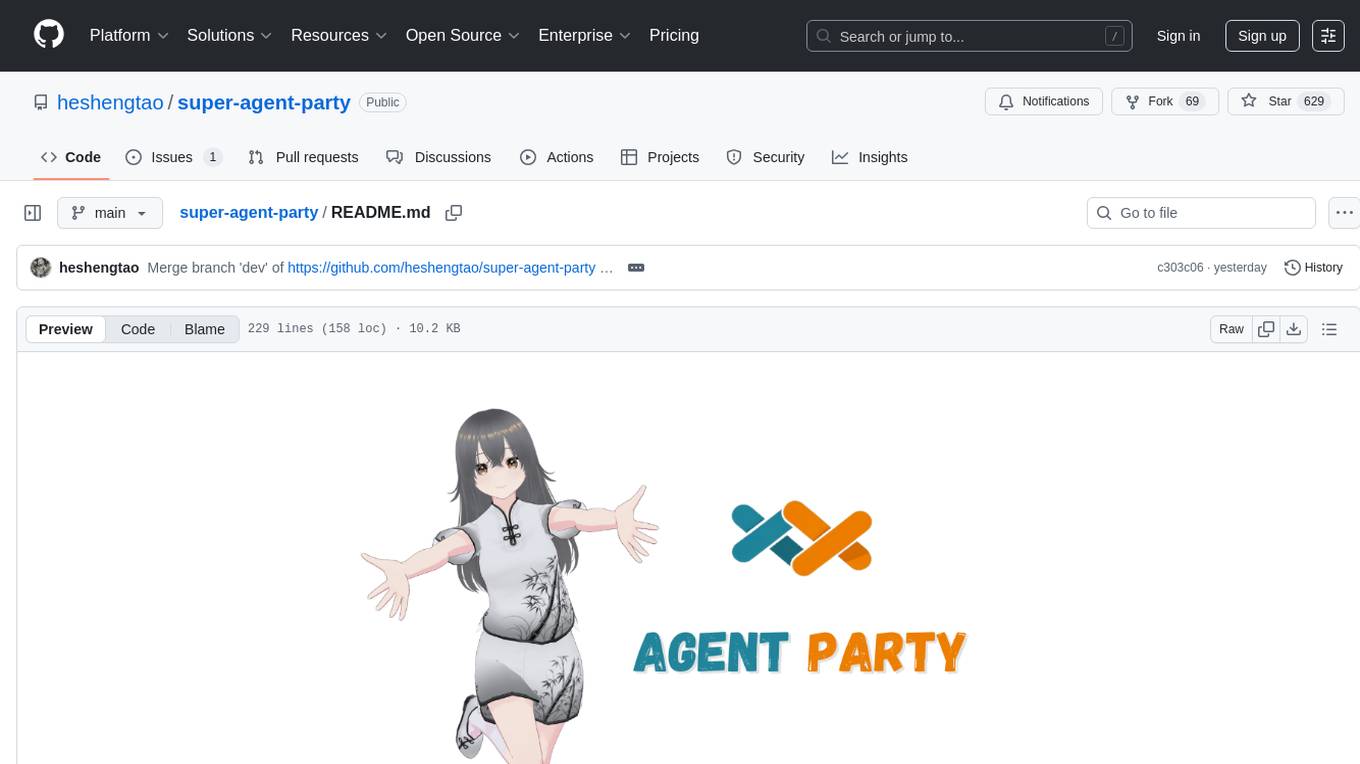
super-agent-party
A 3D AI desktop companion with endless possibilities! This repository provides a platform for enhancing the LLM API without code modification, supporting seamless integration of various functionalities such as knowledge bases, real-time networking, multimodal capabilities, automation, and deep thinking control. It offers one-click deployment to multiple terminals, ecological tool interconnection, standardized interface opening, and compatibility across all platforms. Users can deploy the tool on Windows, macOS, Linux, or Docker, and access features like intelligent agent deployment, VRM desktop pets, Tavern character cards, QQ bot deployment, and developer-friendly interfaces. The tool supports multi-service providers, extensive tool integration, and ComfyUI workflows. Hardware requirements are minimal, making it suitable for various deployment scenarios.
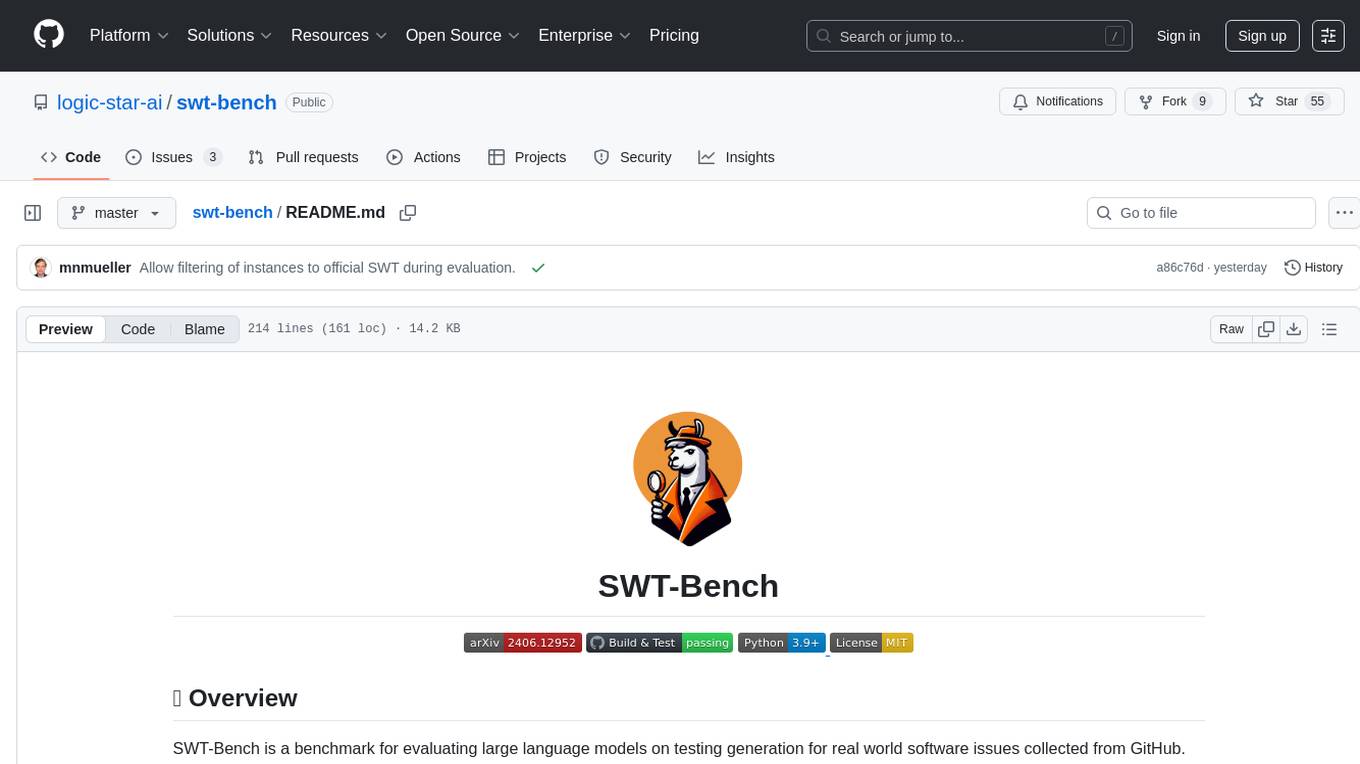
swt-bench
SWT-Bench is a benchmark tool for evaluating large language models on testing generation for real world software issues collected from GitHub. It tasks a language model with generating a reproducing test that fails in the original state of the code base and passes after a patch resolving the issue has been applied. The tool operates in unit test mode or reproduction script mode to assess model predictions and success rates. Users can run evaluations on SWT-Bench Lite using the evaluation harness with specific commands. The tool provides instructions for setting up and building SWT-Bench, as well as guidelines for contributing to the project. It also offers datasets and evaluation results for public access and provides a citation for referencing the work.
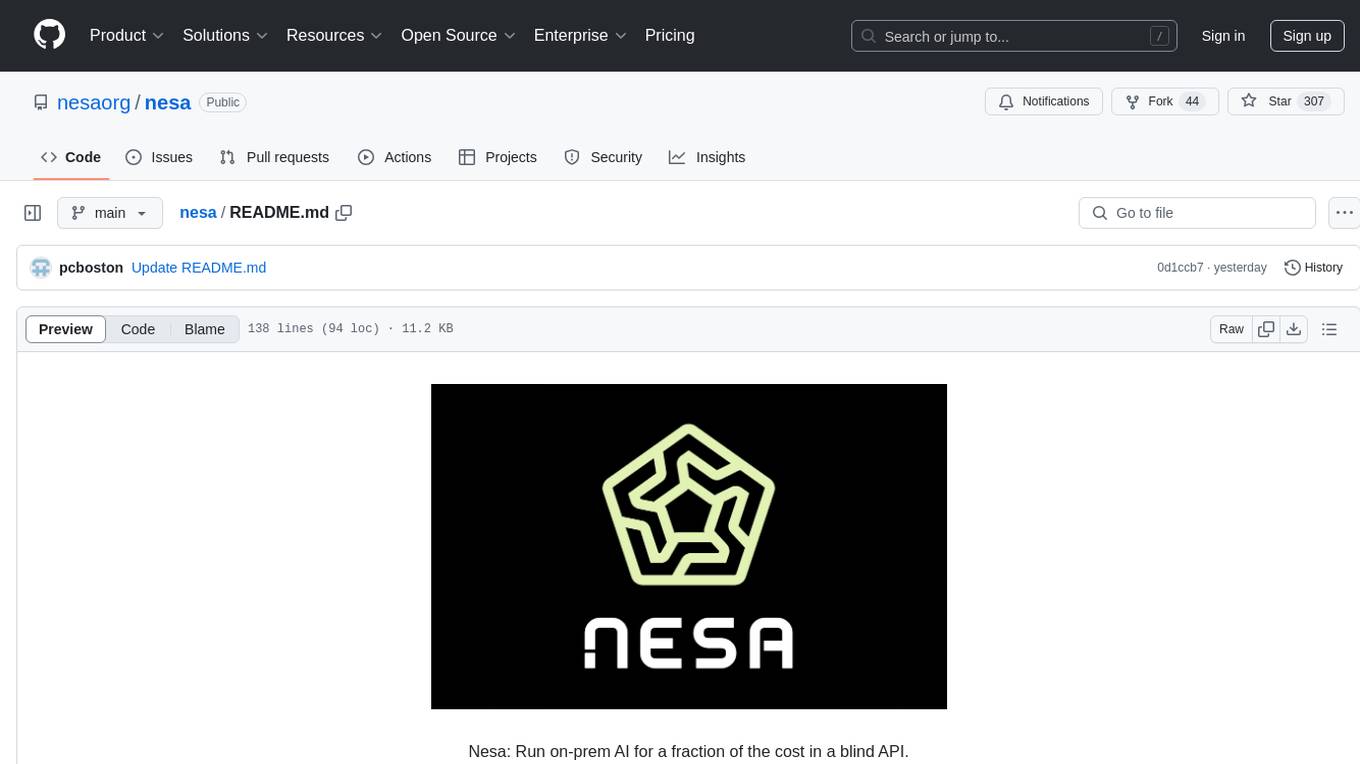
nesa
Nesa is a tool that allows users to run on-prem AI for a fraction of the cost through a blind API. It provides blind privacy, zero latency on protected inference, wide model coverage, cost savings compared to cloud and on-prem AI, RAG support, and ChatGPT compatibility. Nesa achieves blind AI through Equivariant Encryption (EE), a new security technology that provides complete inference encryption with no additional latency. EE allows users to perform inference on neural networks without exposing the underlying data, preserving data privacy and security.
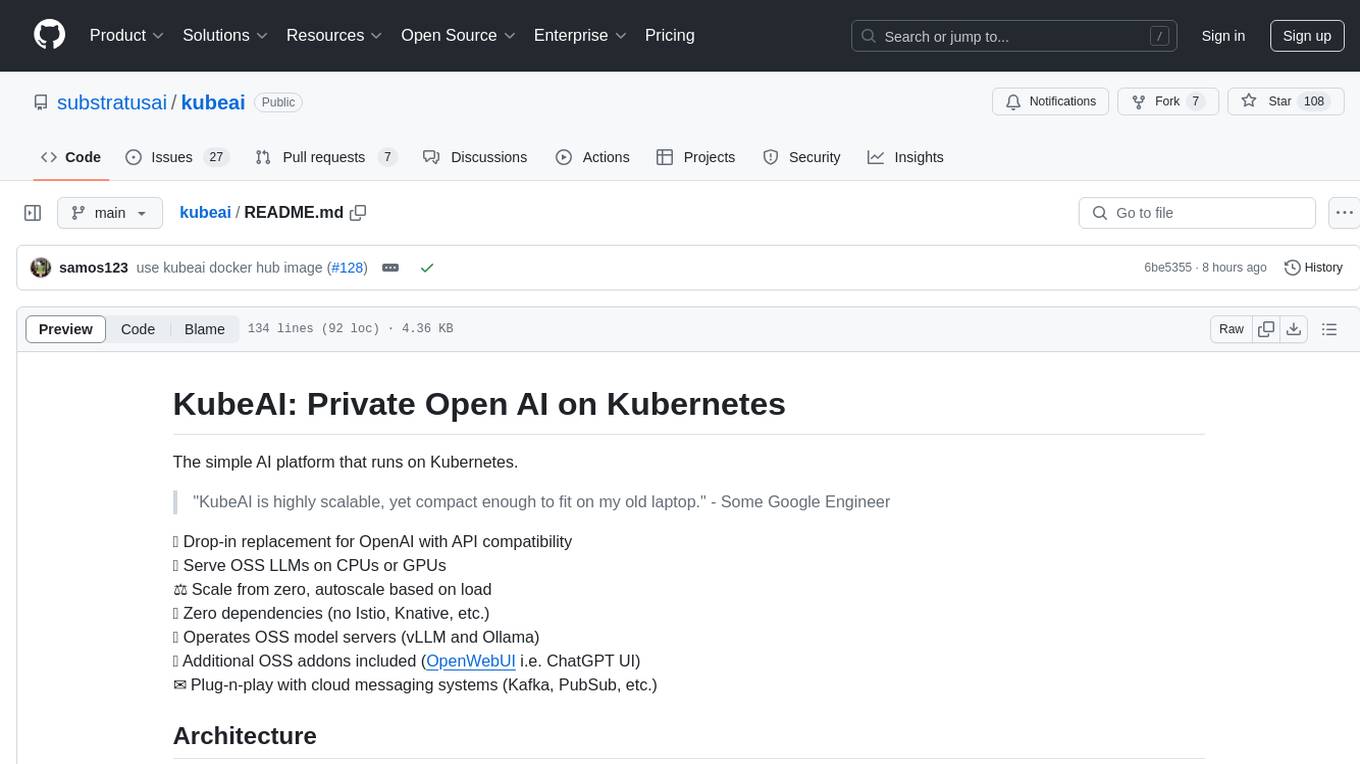
kubeai
KubeAI is a highly scalable AI platform that runs on Kubernetes, serving as a drop-in replacement for OpenAI with API compatibility. It can operate OSS model servers like vLLM and Ollama, with zero dependencies and additional OSS addons included. Users can configure models via Kubernetes Custom Resources and interact with models through a chat UI. KubeAI supports serving various models like Llama v3.1, Gemma2, and Qwen2, and has plans for model caching, LoRA finetuning, and image generation.
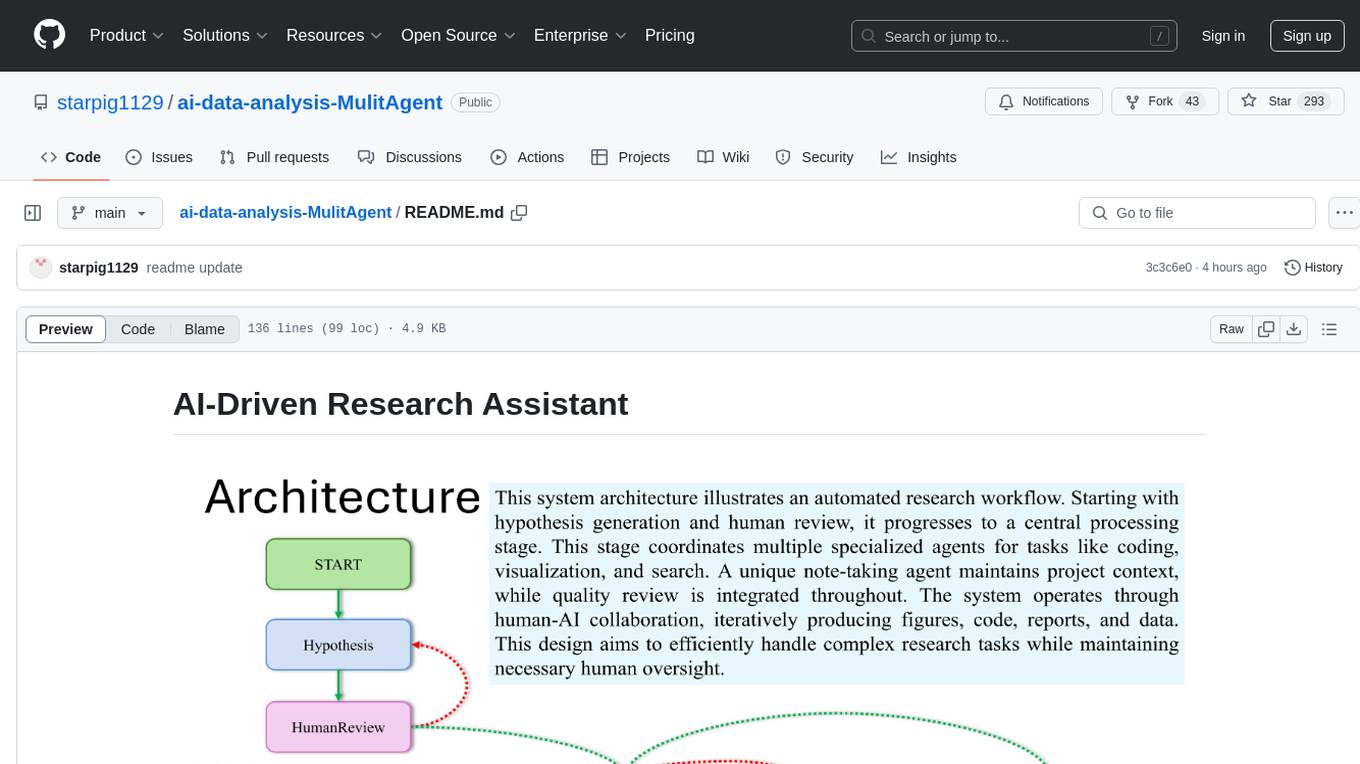
ai-data-analysis-MulitAgent
AI-Driven Research Assistant is an advanced AI-powered system utilizing specialized agents for data analysis, visualization, and report generation. It integrates LangChain, OpenAI's GPT models, and LangGraph for complex research processes. Key features include hypothesis generation, data processing, web search, code generation, and report writing. The system's unique Note Taker agent maintains project state, reducing overhead and improving context retention. System requirements include Python 3.10+ and Jupyter Notebook environment. Installation involves cloning the repository, setting up a Conda virtual environment, installing dependencies, and configuring environment variables. Usage instructions include setting data, running Jupyter Notebook, customizing research tasks, and viewing results. Main components include agents for hypothesis generation, process supervision, visualization, code writing, search, report writing, quality review, and note-taking. Workflow involves hypothesis generation, processing, quality review, and revision. Customization is possible by modifying agent creation and workflow definition. Current issues include OpenAI errors, NoteTaker efficiency, runtime optimization, and refiner improvement. Contributions via pull requests are welcome under the MIT License.
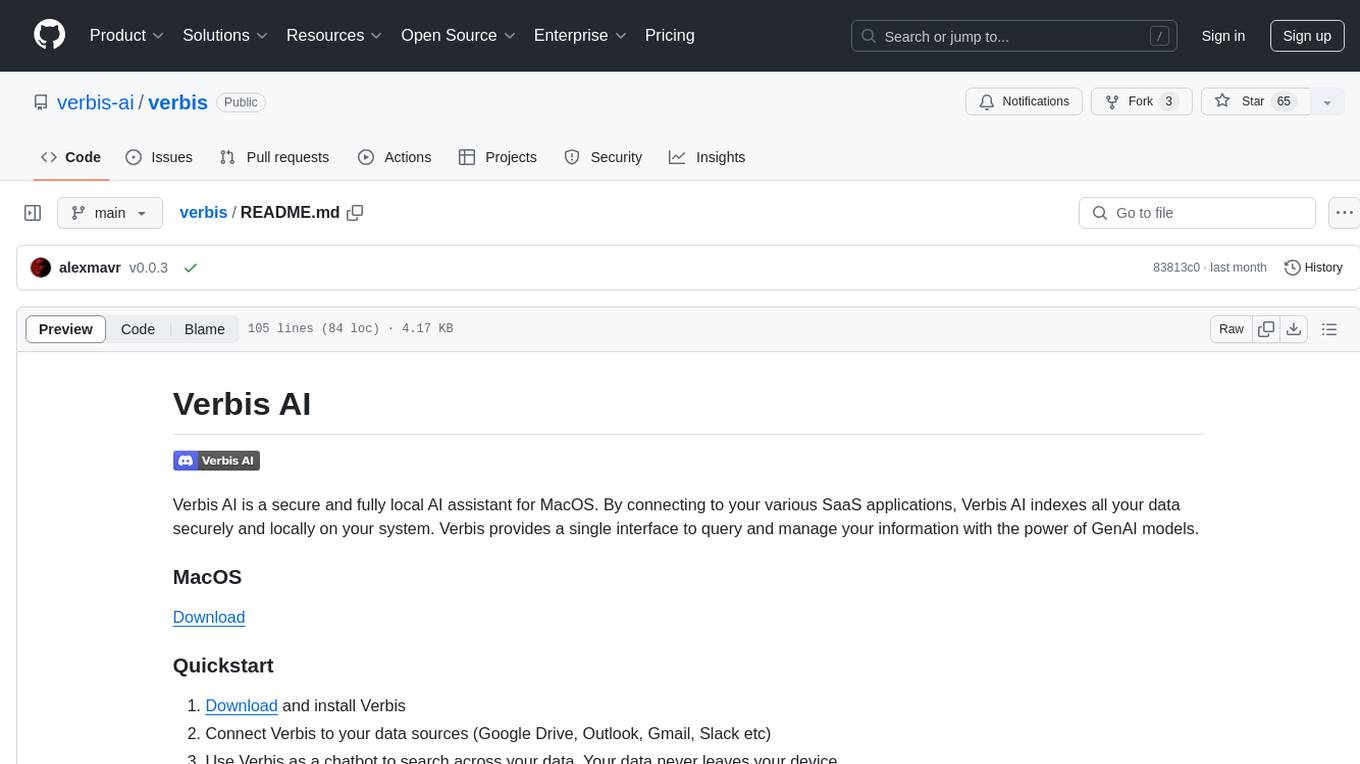
verbis
Verbis AI is a secure and fully local AI assistant for MacOS that indexes data from various SaaS applications securely on the user's system. It provides a single interface powered by GenAI models to query and manage information. Users can connect Verbis to apps like Google Drive, Outlook, Gmail, and Slack, and use it as a chatbot to search across their data without data leaving their device. The tool is powered by Ollama and Weaviate, utilizing models like Mistral 7B, ms-marco-MiniLM-L-12-v2, and nomic-embed-text. Verbis AI requires Apple Silicon Mac (m1+) and has minimal system resource utilization requirements.

LaVague
LaVague is an open-source Large Action Model framework that uses advanced AI techniques to compile natural language instructions into browser automation code. It leverages Selenium or Playwright for browser actions. Users can interact with LaVague through an interactive Gradio interface to automate web interactions. The tool requires an OpenAI API key for default examples and offers a Playwright integration guide. Contributors can help by working on outlined tasks, submitting PRs, and engaging with the community on Discord. The project roadmap is available to track progress, but users should exercise caution when executing LLM-generated code using 'exec'.
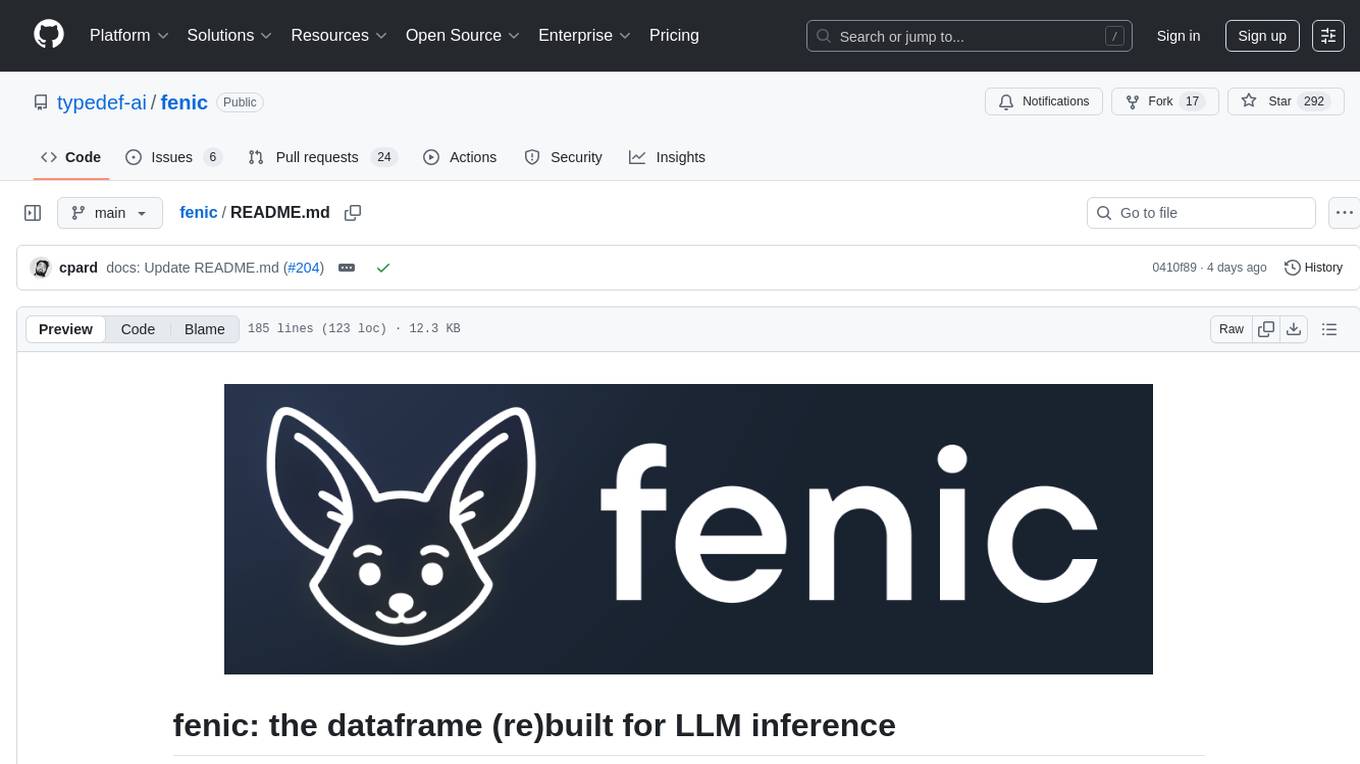
fenic
fenic is an opinionated DataFrame framework from typedef.ai for building AI and agentic applications. It transforms unstructured and structured data into insights using familiar DataFrame operations enhanced with semantic intelligence. With support for markdown, transcripts, and semantic operators, plus efficient batch inference across various model providers. fenic is purpose-built for LLM inference, providing a query engine designed for AI workloads, semantic operators as first-class citizens, native unstructured data support, production-ready infrastructure, and a familiar DataFrame API.
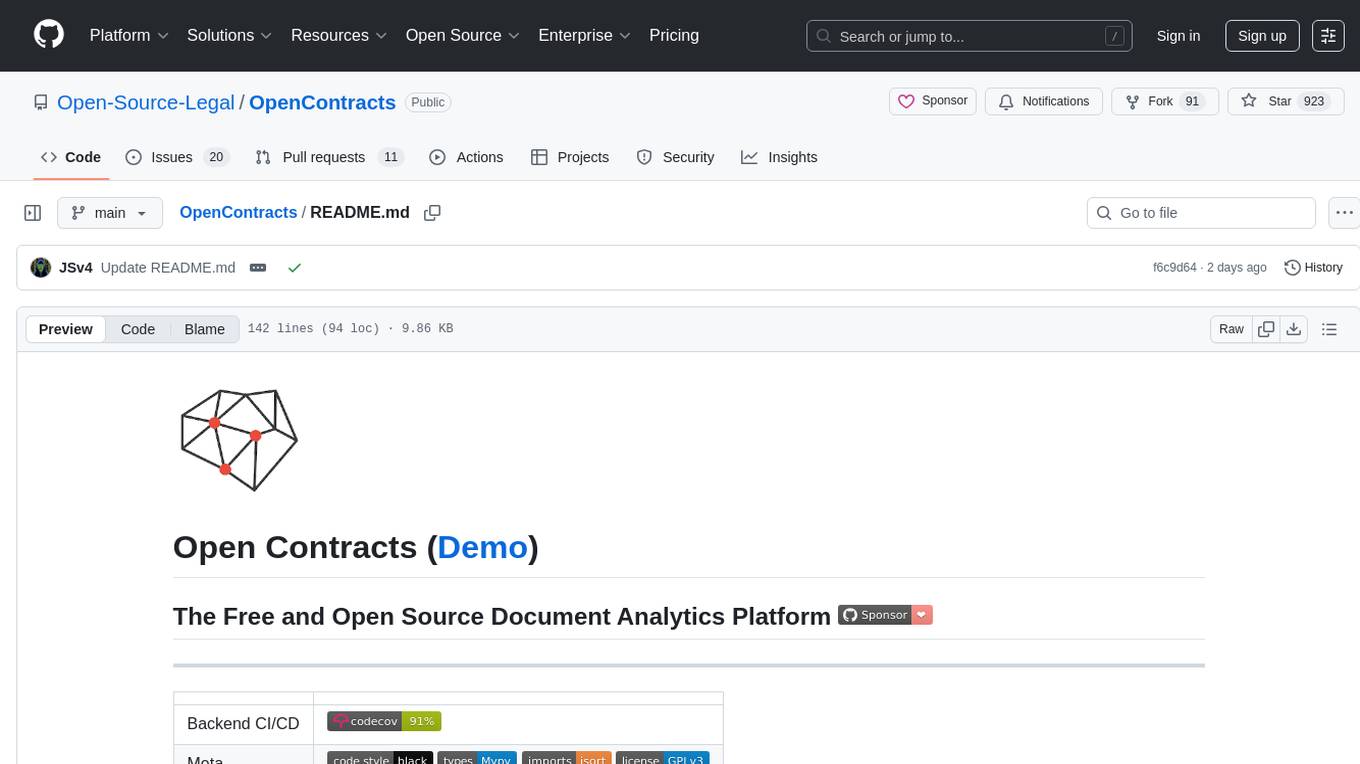
OpenContracts
OpenContracts is a free and open-source document analytics platform designed to empower knowledge owners and subject matter experts. It supports multiple document formats, ingestion pipelines, and custom document analytics tools. Users can manage documents, define metadata schemas, extract layout features, generate vector embeddings, deploy custom analyzers, support new document formats, annotate documents, extract bulk data, and create bespoke data extraction workflows. The tool aims to provide a standardized architecture for analyzing contracts and making data portable, with a focus on PDF and text-based formats. It includes features like document management, layout parsing, pluggable architectures, human annotation interface, and a custom LLM framework for conversation management and real-time streaming.
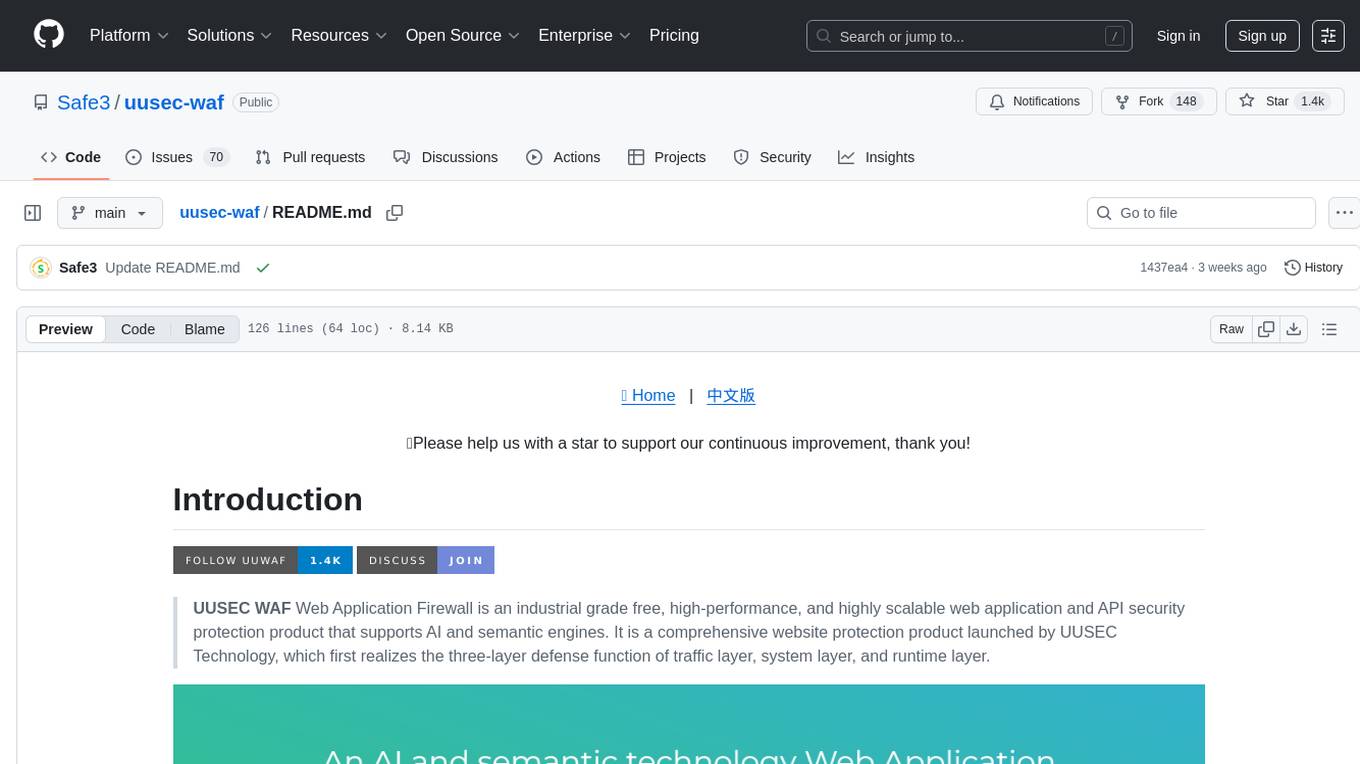
uusec-waf
UUSEC WAF is an industrial grade free, high-performance, and highly scalable web application and API security protection product that supports AI and semantic engines. It provides intelligent 0-day defense, ultimate CDN acceleration, powerful proactive defense, advanced semantic engine, and advanced rule engine. With features like machine learning technology, cache cleaning, dual layer defense, semantic analysis, and Lua script rule writing, UUSEC WAF offers comprehensive website protection with three-layer defense functions at traffic, system, and runtime layers.
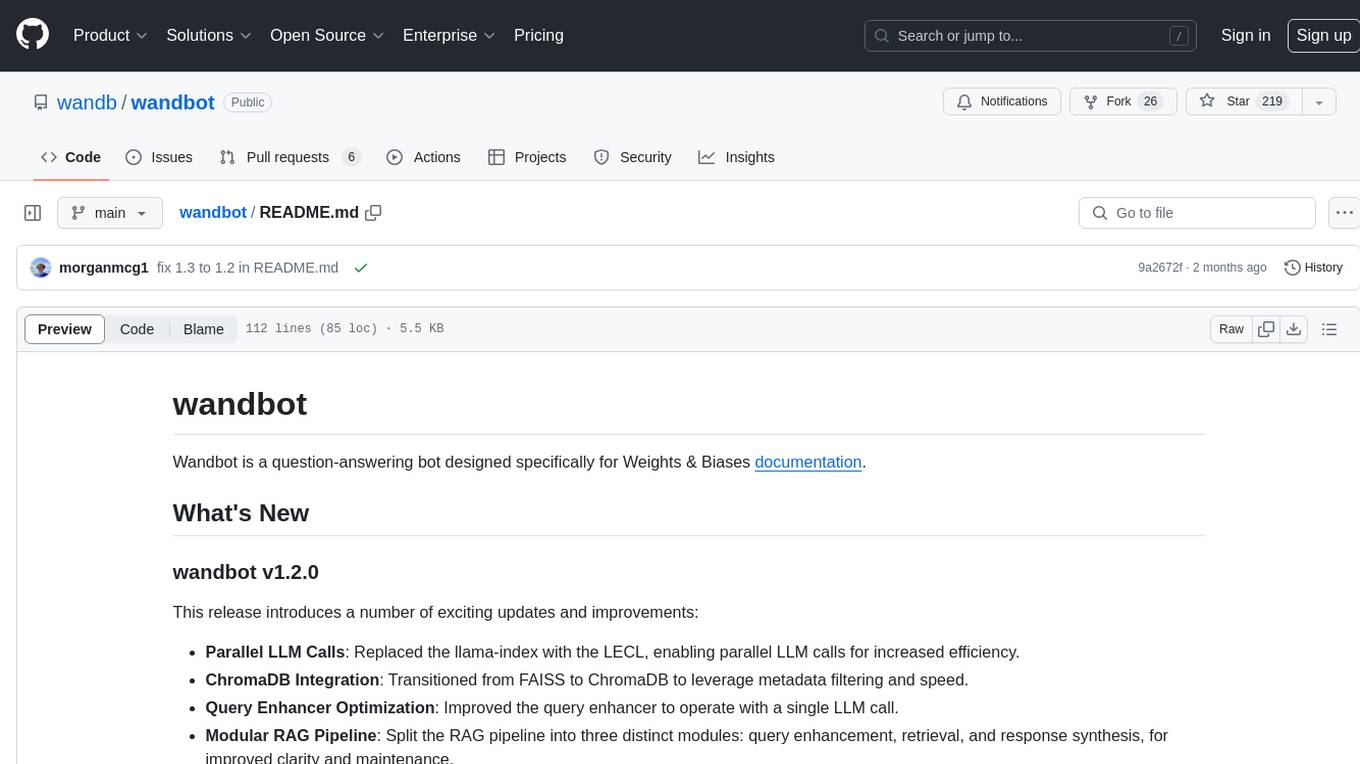
wandbot
Wandbot is a question-answering bot designed for Weights & Biases documentation. It employs Retrieval Augmented Generation with a ChromaDB backend for efficient responses. The bot features periodic data ingestion, integration with Discord and Slack, and performance monitoring through logging. It has a fallback mechanism for model selection and is evaluated based on retrieval accuracy and model-generated responses. The implementation includes creating document embeddings, constructing the Q&A RAGPipeline, model selection, deployment on FastAPI, Discord, and Slack, logging and analysis with Weights & Biases Tables, and performance evaluation.
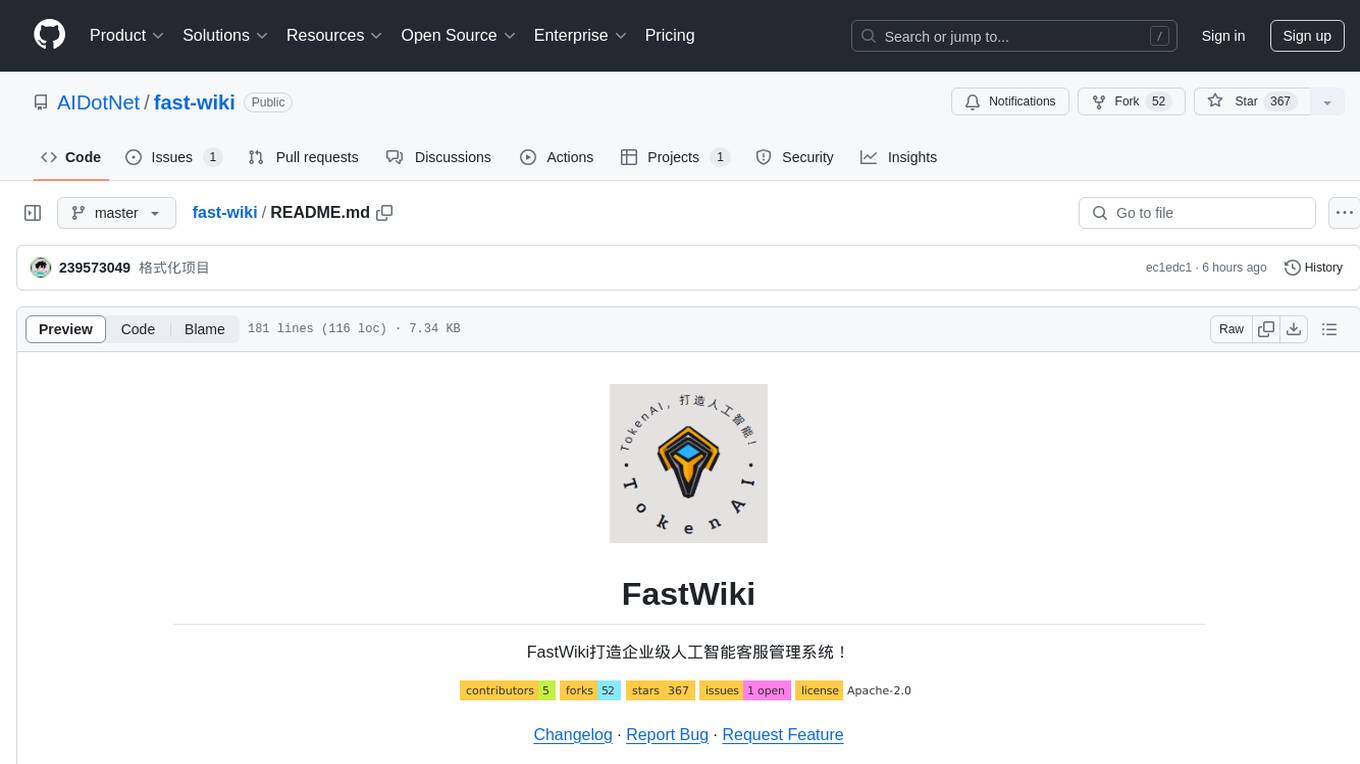
fast-wiki
FastWiki is an enterprise-level artificial intelligence customer service management system. It is a high-performance knowledge base system designed for large-scale information retrieval and intelligent search. Leveraging Microsoft's Semantic Kernel for deep learning and natural language processing, combined with .NET 8 and React framework, it provides an efficient, user-friendly, and scalable intelligent vector search platform. The system aims to offer an intelligent search solution that can understand and process complex queries, assisting users in quickly and accurately obtaining the needed information.
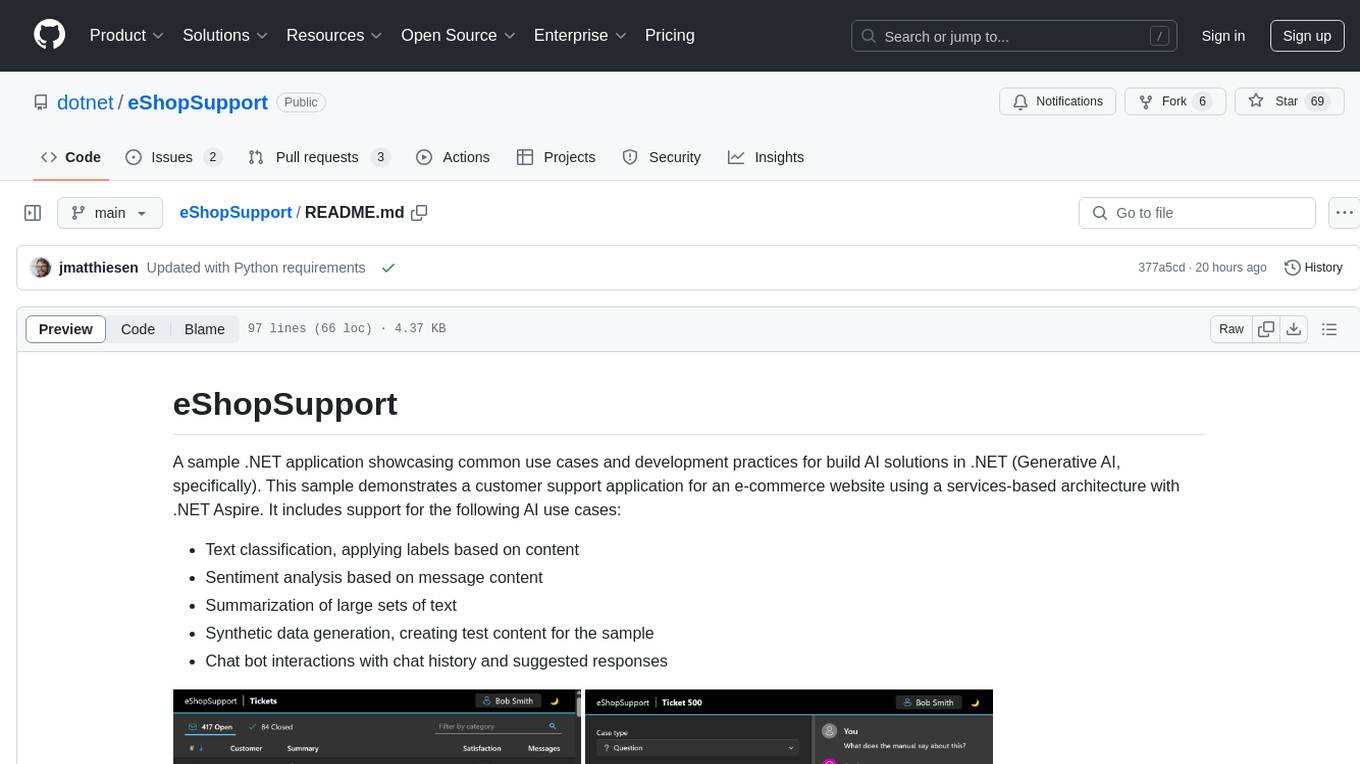
eShopSupport
eShopSupport is a sample .NET application showcasing common use cases and development practices for building AI solutions in .NET, specifically Generative AI. It demonstrates a customer support application for an e-commerce website using a services-based architecture with .NET Aspire. The application includes support for text classification, sentiment analysis, text summarization, synthetic data generation, and chat bot interactions. It also showcases development practices such as developing solutions locally, evaluating AI responses, leveraging Python projects, and deploying applications to the Cloud.
For similar tasks

Azure-Analytics-and-AI-Engagement
The Azure-Analytics-and-AI-Engagement repository provides packaged Industry Scenario DREAM Demos with ARM templates (Containing a demo web application, Power BI reports, Synapse resources, AML Notebooks etc.) that can be deployed in a customer’s subscription using the CAPE tool within a matter of few hours. Partners can also deploy DREAM Demos in their own subscriptions using DPoC.

sorrentum
Sorrentum is an open-source project that aims to combine open-source development, startups, and brilliant students to build machine learning, AI, and Web3 / DeFi protocols geared towards finance and economics. The project provides opportunities for internships, research assistantships, and development grants, as well as the chance to work on cutting-edge problems, learn about startups, write academic papers, and get internships and full-time positions at companies working on Sorrentum applications.

tidb
TiDB is an open-source distributed SQL database that supports Hybrid Transactional and Analytical Processing (HTAP) workloads. It is MySQL compatible and features horizontal scalability, strong consistency, and high availability.

zep-python
Zep is an open-source platform for building and deploying large language model (LLM) applications. It provides a suite of tools and services that make it easy to integrate LLMs into your applications, including chat history memory, embedding, vector search, and data enrichment. Zep is designed to be scalable, reliable, and easy to use, making it a great choice for developers who want to build LLM-powered applications quickly and easily.

telemetry-airflow
This repository codifies the Airflow cluster that is deployed at workflow.telemetry.mozilla.org (behind SSO) and commonly referred to as "WTMO" or simply "Airflow". Some links relevant to users and developers of WTMO: * The `dags` directory in this repository contains some custom DAG definitions * Many of the DAGs registered with WTMO don't live in this repository, but are instead generated from ETL task definitions in bigquery-etl * The Data SRE team maintains a WTMO Developer Guide (behind SSO)

mojo
Mojo is a new programming language that bridges the gap between research and production by combining Python syntax and ecosystem with systems programming and metaprogramming features. Mojo is still young, but it is designed to become a superset of Python over time.

pandas-ai
PandasAI is a Python library that makes it easy to ask questions to your data in natural language. It helps you to explore, clean, and analyze your data using generative AI.

databend
Databend is an open-source cloud data warehouse that serves as a cost-effective alternative to Snowflake. With its focus on fast query execution and data ingestion, it's designed for complex analysis of the world's largest datasets.
For similar jobs

sweep
Sweep is an AI junior developer that turns bugs and feature requests into code changes. It automatically handles developer experience improvements like adding type hints and improving test coverage.

teams-ai
The Teams AI Library is a software development kit (SDK) that helps developers create bots that can interact with Teams and Microsoft 365 applications. It is built on top of the Bot Framework SDK and simplifies the process of developing bots that interact with Teams' artificial intelligence capabilities. The SDK is available for JavaScript/TypeScript, .NET, and Python.

ai-guide
This guide is dedicated to Large Language Models (LLMs) that you can run on your home computer. It assumes your PC is a lower-end, non-gaming setup.

classifai
Supercharge WordPress Content Workflows and Engagement with Artificial Intelligence. Tap into leading cloud-based services like OpenAI, Microsoft Azure AI, Google Gemini and IBM Watson to augment your WordPress-powered websites. Publish content faster while improving SEO performance and increasing audience engagement. ClassifAI integrates Artificial Intelligence and Machine Learning technologies to lighten your workload and eliminate tedious tasks, giving you more time to create original content that matters.

chatbot-ui
Chatbot UI is an open-source AI chat app that allows users to create and deploy their own AI chatbots. It is easy to use and can be customized to fit any need. Chatbot UI is perfect for businesses, developers, and anyone who wants to create a chatbot.

BricksLLM
BricksLLM is a cloud native AI gateway written in Go. Currently, it provides native support for OpenAI, Anthropic, Azure OpenAI and vLLM. BricksLLM aims to provide enterprise level infrastructure that can power any LLM production use cases. Here are some use cases for BricksLLM: * Set LLM usage limits for users on different pricing tiers * Track LLM usage on a per user and per organization basis * Block or redact requests containing PIIs * Improve LLM reliability with failovers, retries and caching * Distribute API keys with rate limits and cost limits for internal development/production use cases * Distribute API keys with rate limits and cost limits for students

uAgents
uAgents is a Python library developed by Fetch.ai that allows for the creation of autonomous AI agents. These agents can perform various tasks on a schedule or take action on various events. uAgents are easy to create and manage, and they are connected to a fast-growing network of other uAgents. They are also secure, with cryptographically secured messages and wallets.

griptape
Griptape is a modular Python framework for building AI-powered applications that securely connect to your enterprise data and APIs. It offers developers the ability to maintain control and flexibility at every step. Griptape's core components include Structures (Agents, Pipelines, and Workflows), Tasks, Tools, Memory (Conversation Memory, Task Memory, and Meta Memory), Drivers (Prompt and Embedding Drivers, Vector Store Drivers, Image Generation Drivers, Image Query Drivers, SQL Drivers, Web Scraper Drivers, and Conversation Memory Drivers), Engines (Query Engines, Extraction Engines, Summary Engines, Image Generation Engines, and Image Query Engines), and additional components (Rulesets, Loaders, Artifacts, Chunkers, and Tokenizers). Griptape enables developers to create AI-powered applications with ease and efficiency.

